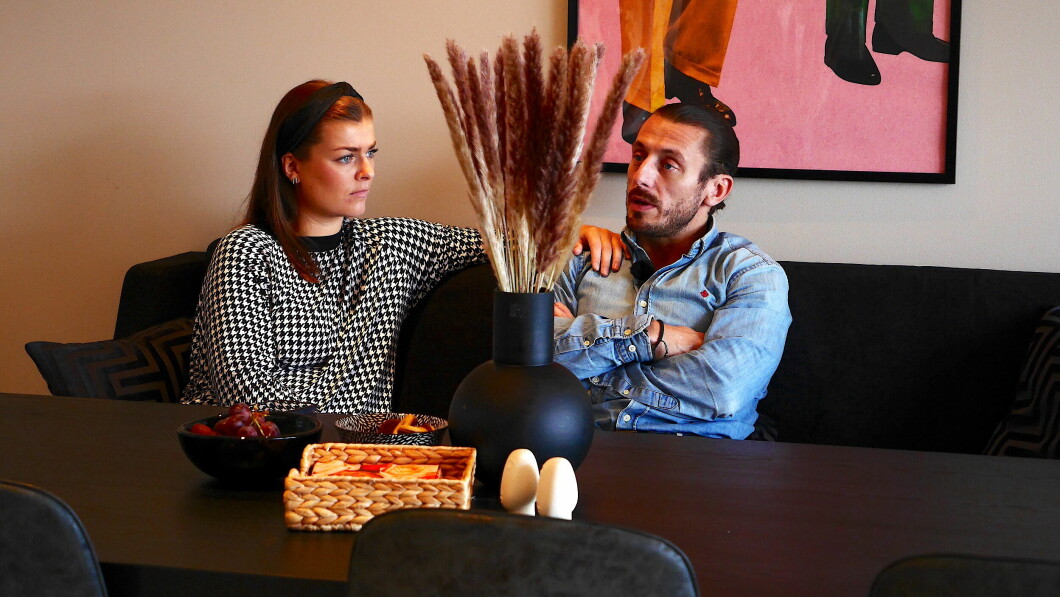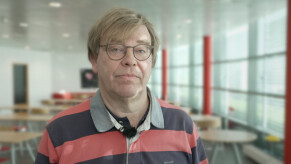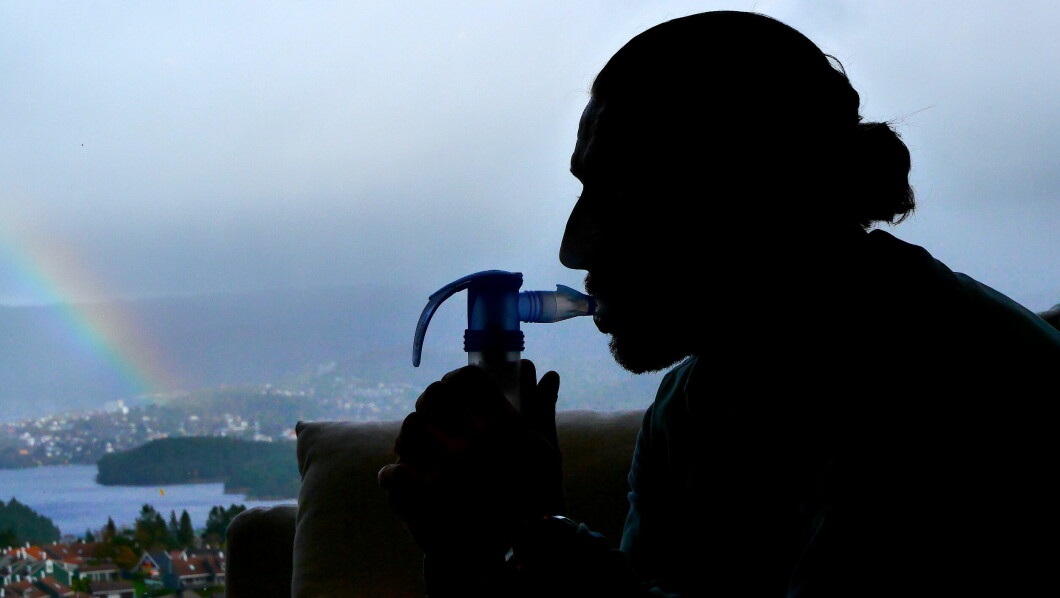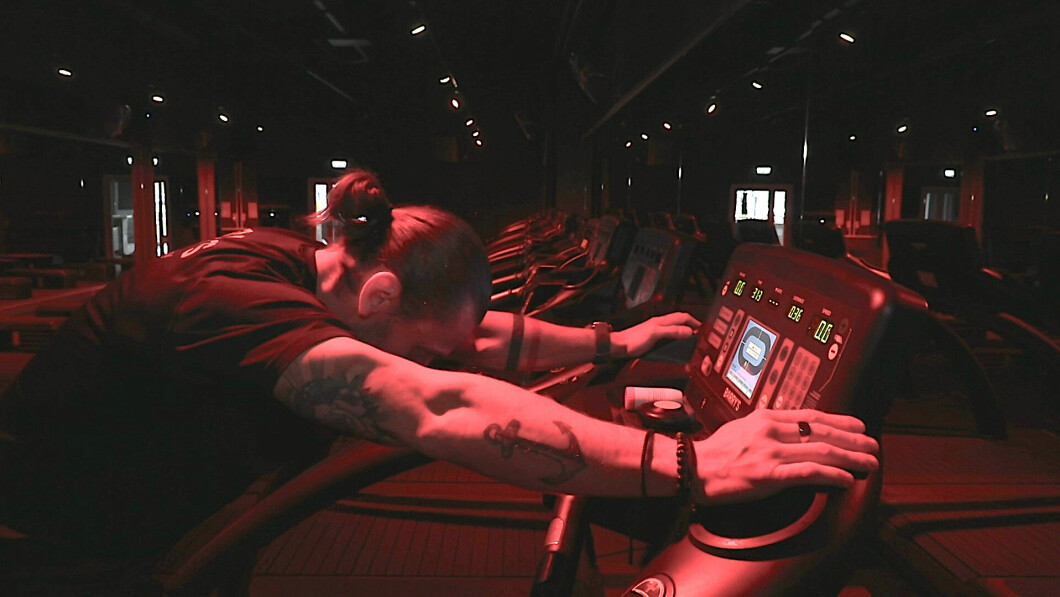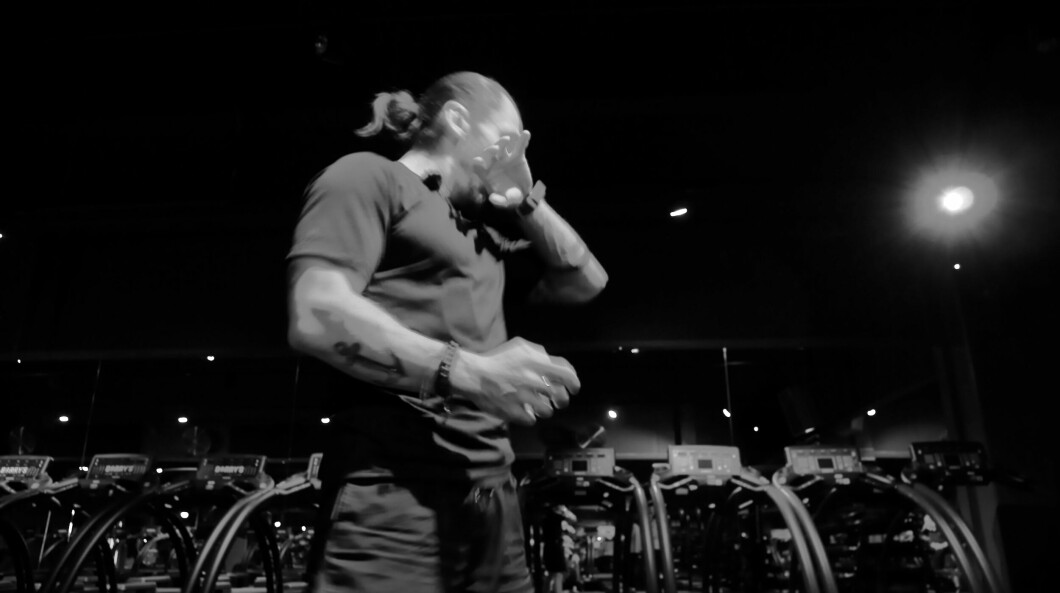Christian Lulli lives with a chronic disease that severely affects the lungs. His lung capacity is currently 36 percent, and he often gets infected.
In order to breathe, he must spend several hours each day exercising and breathing into the machine. Both help him remove tough mucus from the lungs. This process is uncomfortable and painful.
He knows that patients with this diagnosis rarely live to old age.
Now it’s also becoming resistant to antibiotics, and the cold season can be really tough.
If the lung capacity drops below twenty percent, a lung transplant is the only chance. But there are many others in the queue.
– If I get sick now, they have nothing to give me. Antibiotics will not work. We have nothing to play with.
“Can you move to Denmark?”
It was a year of great contradictions for Christians.
At first he got the dream job, then he moved to a new house with his 13-year-old daughter and girlfriend Selji. This summer he learned that Selji was pregnant, and that the family of three would soon be four.
But then the question came from the doctor who turned everything around.
“Can you move to Denmark?”
– It took a few days before I really understood what he was asking of me, says Christian.
Transition process: Christian and cohabitant Selge does not know whether the child on the way will be born in Norway or in Denmark. They may have to go out of the country to get the medicine Christians need to survive. Photo: Kåre Breivik/TV 2
The Danes provide medicine, Norway does not
A quarter of an hour later, Christian realized that what the doctor thought was Denmark was probably his last chance.
Denmark is actually one of several countries that introduce a new drug for cystic fibrosis called Keftrio. It was proven that the drug has a good effect on those who used it.
The majority of patients after a short time have a sharply increased lung capacity, while the number of infections decreases. Their quality of life is greatly improved.
Although the drug is so new that the long-term effects are not yet known, there is reason to expect that the drug could make patients live longer. That’s what Pål Leyell Finstad, MD, chief medical officer of the Cystic Fibrosis Center says.
He believes the drug should be available in Norway as soon as possible.
Many factors affect life expectancy in cystic fibrosis, but in general, patients have underestimated life expectancy. It is hoped that a so-called new cause-correcting therapy such as Kaftrio, will be able to significantly improve prognosis, says Fenstad.
But the Norwegian Health Service will not provide the drug because it is too expensive.
cystic fibrosis
- Cystic fibrosis is a multi-organ genetic disease, with disturbances in the function of glands in many organs, including the lungs, gastrointestinal tract, and pancreas.
- The disease leads to the formation of abnormally strong mucus that clogs the glands and ducts, especially in the lungs, sinuses, pancreas, and male reproductive organs.
- Treatment includes, among other things, a lot of physical activity and agents that dissolve the mucus. Frequent antibiotic regimens are often necessary to treat respiratory infections.
- When the disease has come a long way and is entering a terminal stage, a lung transplant is necessary.
- Cystic fibrosis is a fatal disease, but the prognosis for it is better today than it was a few years ago. The average life expectancy today is more than 40 years.
- In recent years, drugs have been developed that can treat the primary protein defect that causes cystic fibrosis. These medicines are not yet approved in Norway.
Source: Nhi / Norwegian Cystic Fibrosis Association
– The simple answer is that the price is too high. Too high, says Bard Christian Scheem, director of Health West. He participates and advises the Decision Forum, which makes the final decisions on the new approaches to be introduced in Norway.
Decision-making forums make decisions based on three criteria established by Parliament, namely utility, resource use, and risk.
As for the animals: The director of Health West, Baard-Christian Schem, stresses that they would like to provide treatment to patients in Norway, but the price the manufacturer is asking is too high. Photo: Christian Mehry/TV2
Schem emphasizes that in this case, it is not the severity of the disease or the effect of the drug that is at stake, but the price is very high. When the manufacturer also has a monopoly on drug delivery, it cannot be obtained elsewhere.
We will cover many types of services in the course of our work. Then we must treat all patient groups equally. We must have a level of what one can accept in terms of price-for-benefit for all patient groups.
This is how new treatments are introduced
Everyone can make suggestions about treatment they think might be relevant to a professional health service. Proposals are evaluated by the Application Forum, which then directs the Norwegian Institute of Public Health and the Norwegian Medicines Agency to conduct style evaluations of relevant proposals.
The decision forum makes the final decision on which methods to use. The Resolution Forum consists of four Managing Directors of the Regional Health Funds.
The decision forum bases the decision on three criteria set by Parliament, namely utility, resource use, and risk. Standards are evaluated together and weighed against each other. The Decision Forum makes decisions that are as fair and equal as possible for all patients.
negotiating the price
In the past year, more than 20 countries have adopted the Kvitrio. Norway and Sweden are the only two countries in the Nordic region that have not approved the drug. What price other countries will have to pay for it is unknown.
– Because the company demands confidentiality agreements and secret prices. This applies to all countries, meaning we can’t see the prices other countries have received, says Schem.
Negotiations are now underway with the manufacturer, hoping to lower the price.
– What is the acceptable price?
It is not easy to say, because this can be measured in many ways. But the price should fall significantly below the price level it is at now, says Schem.
Eric Gilberg, at pharmaceutical company Vertex, wrote in an email to TV 2 that they are experimenting with a constructive dialogue with the Norwegian government, and that they are committed to working together to find a solution acceptable to all parties.
“The price of our drugs reflects the clinical value and benefits that it provides to patients, caregivers, and healthcare professionals. In addition to creating value for the CF environment, we are investing heavily in research. We believe we have a strong R&D strategy, which means we can deliver transformative drug innovations, as the use of Income and profits from a single drug for new drug discovery and development,” Gilberg wrote.
It costs more than two million kroner a year
Today you can buy the drug on prescription at the maximum advertised price. The maximum rate is NOK 7000 per day.
For Christian, this means that if he wanted to become a veranda in Norway, he would have to pay more than 2.5 million NOK, a quarter of the year, out of his own pocket.
Without medication, he would eventually need a lung transplant. But waiting lists are long, and Denmark could quickly become the only option.
We are now in a process where we almost have to become health refugees to get the help I need to survive, says Christian Lulli.
Christian must save his life while waiting for medicine
In the meantime, Christian must train all he can. Ideally, he should train throughout the day, keeping his lungs as close as possible, and getting rid of the mucus that prevents him from breathing.
But there is no doubt that it is painful, and only increases.
– Now I feel that the body is tired. Soon there will be no more in stock. But I didn’t have as much to fight for as I do now.
When the pain is at its worst, and he really wants to lie down and rest, he thinks of the family waiting at home, and the baby on his way.
– This isn’t just me. If I don’t have the strength or if I’m in pain, then I have to keep going anyway. Because they deserve to be there.
We will see the girls grow up
Prefer not to move to Denmark. He wants his daughter to be born in Norway. They will grow up in Norway. He will keep the house he recently bought and will continue to do the work he enjoys so much, and he will live in close proximity to family and friends.
But most of all, he wants to see his daughters grow up. Then Denmark might be his last chance.

“Organizer. Social media geek. General communicator. Bacon scholar. Proud pop culture trailblazer.”



